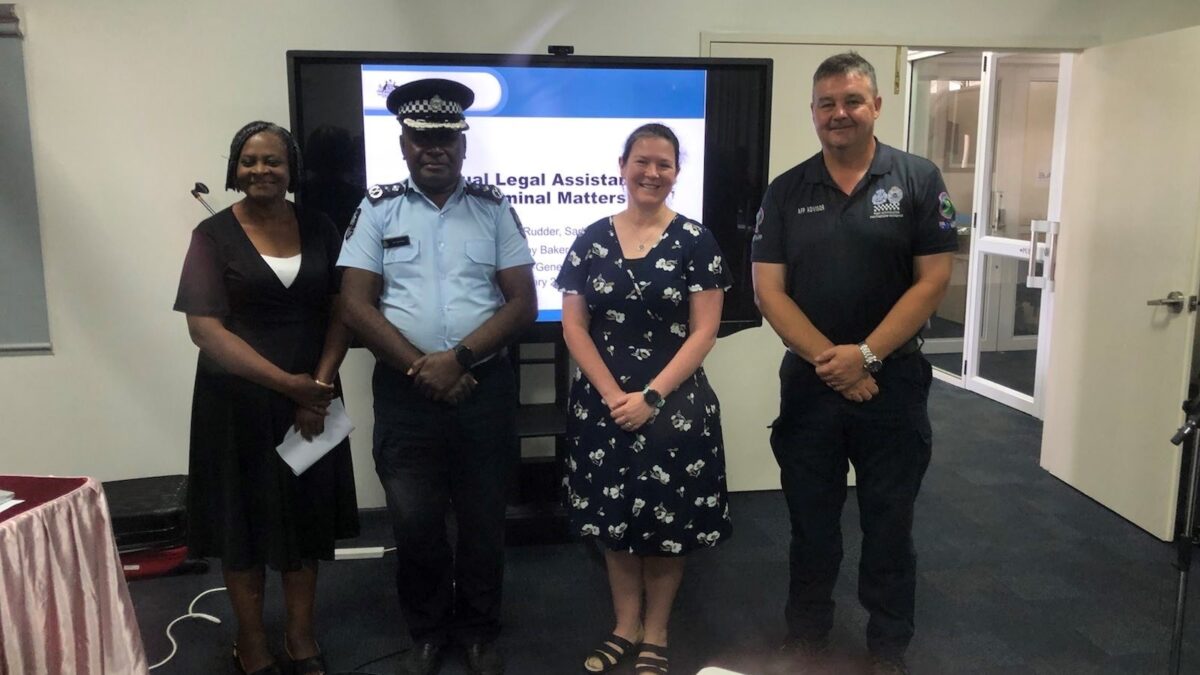

L-R) Mrs Rachel Olutimayin, Director of Public Prosecutions (ODPP), Mr Ian Vaevaso, Deputy Commissioner, National Security and Operation Support, RSIPF, Meg Rudder, Senior Legal Officer, AGD, Pacific, and Paul Ryan, Acting Superintendent, RAPPP Frontline and Crime
Solomon Islands Mutual Assistance in Criminal Matters Training
Recently representatives of the Australian Attorney-General’s Department (AGD) travelled to Honiara, Solomon Islands, to deliver mutual legal assistance training.
Mutual legal assistance is the legal process used to obtain evidence from foreign countries for formal use in a criminal investigation or prosecution – an essential part of the toolkit for tackling transnational crime.
The training was developed by the AGD’s Pacific Section in 2021 as a result of a request by the Office of the Director of Public Prosecutions (ODPP) and is in line with the Pacific Police Development Program – to strengthen crime and policing laws and to build the capabilities of law and justice agencies and officials. It is part of Australia’s broader efforts to assist Pacific Island countries to address transnational crime.
The two-day conference was opened by Mrs Rachel Olutimayin, Director of Public Prosecutions alongside Mr Ian Vaevaso, Deputy Commissioner, National Security and Operation Support, Royal Solomon Islands Police Force (RSIPF), and Meg Rudder, Senior Legal Officer, AGD, Pacific.
Over two days 40 participants from the ODPP, the RSIPF and the Attorney General’s Chambers (AGC), including several senior Solomon Islands Government officials heard presentations from representatives from the AGD and Australian Federal Police (AFP) officers based in Honiara, under the Royal Solomon Islands Police Force (RSIPF) and AFP Policing Partnership Program (RAPPP).
The training included small group activities where participants could apply their learning in a hypothetical context and exposed participants to the benefits and uses of mutual legal assistance, in accordance with the Mutual Assistance in Criminal Matters Act 2002.
Participants have gained a better understanding of the processes to follow when handling or initiating requests, the standards of proof required and the requirements of Solomon Islands’ domestic mutual assistance legislation. This knowledge will allow Solomon Islands to make and receive requests to obtain evidence from foreign countries in support of criminal matters.
ODPP, in partnership with AGD, has also developed a manual detailing the processes for ODPP case officers to follow when handling mutual assistance requests in Solomon Islands, as well as a comprehensive collection of templates that officers can use when corresponding with foreign countries, making requests, and appearing in court. The manual was finalised in late 2022 and presented to all participants at the training.
Through the development of the manual, the significant role that the RSIPF and the AGC plays in actioning requests for mutual legal assistance was recognised. As a result, the ODPP invited the RSIPF and AGC to the training. This promotes stronger collaboration and role clarity between these agencies.
RAPPP continues to assist the RSIPF with the development of internal governance regarding the role of RSIPF in support of Solomon Islands’ domestic mutual assistance legislation and the manual.
RAPPP will incorporate MAR training into capability development initiatives across the investigation portfolio, demonstrating a joined-up approach by AGD and the AFP to contribute to achieving important Pacific Islands law enforcement outcomes.

Deputy Commissioner Ian Vaevaso officially opening the course of 40 participants from the Office of the Director of Public Prosecutions, Royal Solomon Islands Police Force and Attorney-General’s Chambers.

Detective Acting Sergeant Mark Weber, RAPPP Advisor Crime and Intelligence, addresses course participants regarding the role of RSIPF in Mutual Assistance Requests.

Mutual Assistance training facilitators, from the Australian Attorney-General Department and RAPPP, with course participants.
//End//